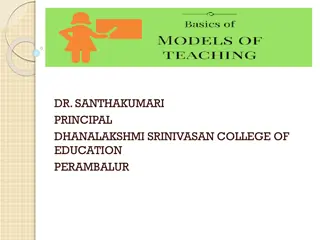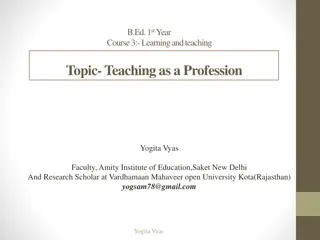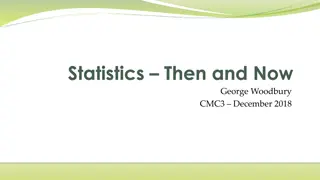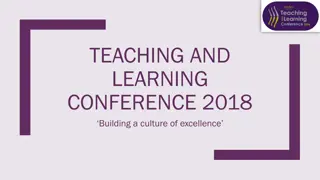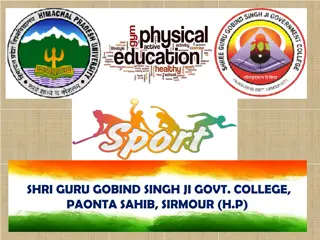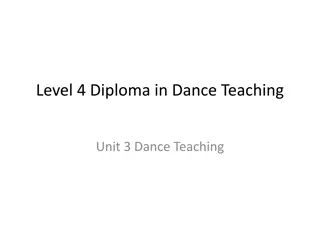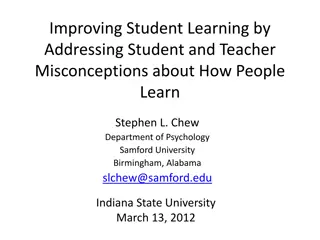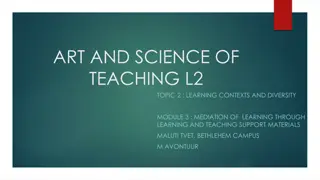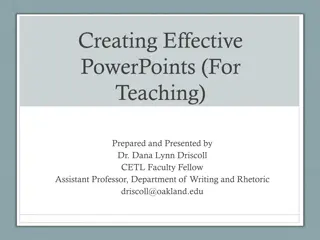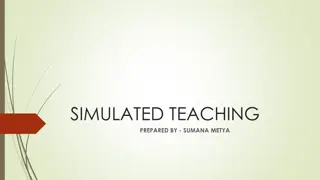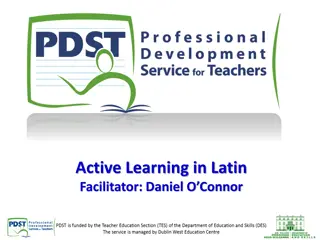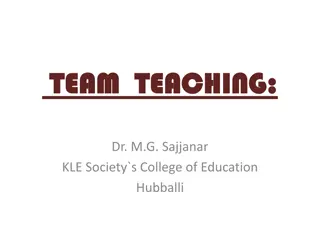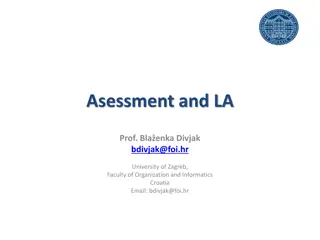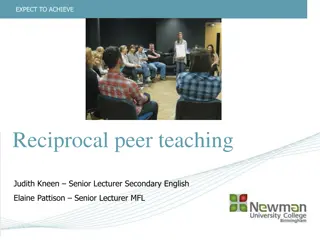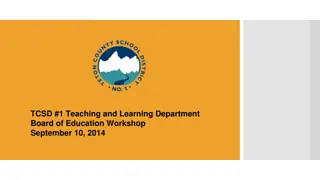Understanding Engagement in Teaching and Learning
Exploring key aspects like motivation, interest, cognitive engagement, and behavioral engagement in teaching and learning. Covers various measurement methods and dimensions of engagement for effective educational practices.
Download Presentation

Please find below an Image/Link to download the presentation.
The content on the website is provided AS IS for your information and personal use only. It may not be sold, licensed, or shared on other websites without obtaining consent from the author. Download presentation by click this link. If you encounter any issues during the download, it is possible that the publisher has removed the file from their server.
E N D
Presentation Transcript
Foundations of Teaching and Learning November 15, 2021
Assignment 4 Overview Any comments or questions?
Motivation, Interest, and Engagement Each a large enough topic that they could easily be a class by themselves Today is necessarily going to be an overly- rapid survey Still, please ask lots of questions and share your thoughts
Engagement and Disengagement Cognitive Behavioral Affective (will be discussed in mid-December) (Fredricks et al., 2004)
Cognitive Engagement Sometimes operationalized through questionnaires (often using self-reports of behaviors that sound more to me like self- regulated learning behaviors)
Cognitive Engagement Instrument (Greene & Miller, 1996)
Alternative measures Measuring mental effort using EEG (Mills et al., 2017) Experience sampling for mind wandering (Schooler et al., 2005) Measuring mind wandering using interaction data (Mills & D Mello, 2015) or eye tracking (Reichle et al., 2010; Hutt et al., 2017)
Behavioral engagement Considered both in long-term and short-term Measured in a range of ways Self-report Observation Interaction logs (see review in Baker & Rossi, 2014)
Behavioral engagement: longer-term Attendance School dropout College attendance Participation in career pipeline Grit (will discuss in a minute)
Behavioral engagement: short-term Off-Task Behavior Gaming the System Carelessness Wheel-Spinning
Behavioral engagement: short-term Off-Task Behavior Gaming the System Carelessness Wheel-Spinning Evidence is stronger for longitudinal negative impact of gaming the system and carelessness than off-task behavior! (Pardos et al., 2014; San Pedro et al., 2014; Almeda & Baker, 2020)
Grit My personal story of repeated failure and continual struggle on the way to UPenn
What is grit? Perseverance and passion for long-term goals.
Does grit matter? Recent meta-analysis (Crede et al., 2016) reported as finding that grit doesn t matter But a closer reading of that meta-analysis indicates that, across 88 studies, grit is associated with better long-term outcomes However, the self-discipline and persistence aspects of grit matter more than the passion aspect
Is grit a unitary construct? Crede et al (2016) argue that passion and perseverance are separate
Wheel-spinning Beck & Gong (2013) find that many students complete 10 of the same type of problem in a learning system without reaching mastery
Wheel-spinning Beck & Gong (2013) find that many students complete 10 of the same type of problem in a learning system without reaching mastery Anecdotally, I ve seen data where a student completed 141 of the same type of problem without reaching mastery
Wheel-spinning, grit, and outcomes Adjei et al. (2021) study relationship to college attendance years later Grit associated with positive outcomes years later Quitting too quickly is associated with negative outcomes Wheel-spinning had null effect
How do we avoid wheel-spinning while being gritty? AKA how do we convert wheel-spinning to grit? What strategies can we use, or ask our students to use?
What is deliberate practice? Why is it important?
Should we always be gritty anyways? Can any of you name situations where you are glad you weren t gritty?
How How do we get our students to be gritty on important tasks? Pursuing their passions (that matter) with continued and deliberate effort
Past experiences Has anyone here worked in a school or organization that tried to create grit? Was it successful?
Self-theories (Dweck & Leggett, 1988; Dweck, 2000) Theory of Fixed Intelligence Entity Theory , Fixed Mindset Intelligence is not changeable Some people are smart and some people are dumb Theory of Malleable Intelligence Incremental Theory , Growth Mindset Intelligence can be increased through one s efforts Everyone can become smarter
Generally positive evidence for Growth Mindset interventions Associated with improving grades across middle school (Blackwell et al., 2009) Improved grades for high school students (Paunesku et al., 2015) Improved GPA for high school students (Yeager et al., 2016) Null effect in large study of students entering college for retention or GPA (Yeager et al., 2016)
Past experiences Has anyone here worked in a school or organization that tried to create a growth mindset? Was it successful?
How should growth mindset interventions be delivered? Yeager seems to find positive effects for text messages delivered by internet. Class DoJo uses cartoons. Which is the best way to do this? Should teachers be involved?
Delay of Gratification https://www.youtube.com/watch?v=QX_oy9614 HQ
Delay of Gratification Several studies by Walter Mischel have found that the ability to wait to eat the marshmallow are associated with better life outcomes
Past experiences Has anyone here worked in a school or organization that tried to encourage delay of gratification? Was it successful?
Goals Historically referred to as goal orientation (Pintrich, 2000) But typically term orientation is now dropped based on evidence that student goals are situationally determined and malleable cf. McNeil & Alibali, 2000
Core Goals Learning/Mastery Goals (Dweck & Elliott, 1983) Performance-Approach Goals (Elliot & McGregor, 2002) Performance-Avoidance Goals (Elliot & McGregor, 2002) Work Avoidance Goals (Harackiewicz et al., 1997)
Correlations to Outcomes: Mostly Small and Somewhat Unstable Exam Scores Course Grades Mastery Goals Sometimes/r<0.2 Sometimes Performance- Approach Goals Sometimes/r<0.2 Sometimes/r<0.2 Performance- Avoidance Goals Replicated; r of -0.25 to -0.3 Sometimes Work Avoidance Goals No results Sometimes/r<-0.2
Some Evidence That goals are malleable (McNeil & Alibali, 2000) But that it can be effective to align pedagogical support with either performance- approach or learning goals (Rebolledo- Mendez et al., 2005, 2006, 2008)
Interest (Hidi & Renninger, 2006) Diagram from Beh (2015)
Overall Questions? Comments?
Upcoming Classes 11/24: (Special Day) Constructionism 12/3: Effective Learning Strategies 12/10: Emotions and Learning 12/17: Social Factors that Mediate Learning 12/20: Final Paper due
6 groups: you are developing 1. Training for sales people trying to convince local mini- marts to stock a new type of ice cream 2. A new charter high school for disadvantaged students 3. An intake program for undergraduates at a low-tier rural university 4. An intake program for undergraduates from very low HDI countries at Penn 5. A support group for PhD students at a top-ranked engineering graduate school with high dropout rates 6. A training program for aspiring childrens chess champions




